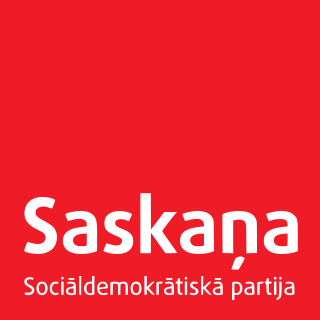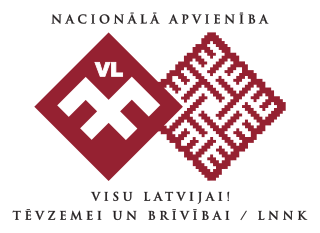
The politics of Latvia takes place in a framework of a parliamentary representative democratic republic, whereby the prime minister is the head of government, and of a multi-party system. The President holds a primarily ceremonial role as Head of State. Executive power is exercised by the government. Legislative power is vested in both the government and parliament, the Saeima. The Judiciary is independent of the executive and the legislature. The Economist Intelligence Unit rated Latvia a "flawed democracy" in 2022.

The Latvian Russian Union (LKS) is a political party in Latvia supported mainly by ethnic Russians and other Russian-speaking minorities. The co-chairpersons of the Latvian Russian Union were Miroslavs Mitrofanovs and an alleged Russian agent Tatjana Ždanoka.

Russians in the Baltic states is a broadly defined subgroup of the Russian diaspora who self-identify as ethnic Russians, or are citizens of Russia, and live in one of the three independent countries — Estonia, Latvia, and Lithuania — primarily the consequences of the USSR's forced population transfers during occupation. As of 2023, there were approximately 887,000 ethnic Russians in the three countries, the year of the last census during the 1944–1991 Soviet occupation of the three Baltic countries.

Riga City Council is the government of the city of Riga, the capital of Latvia. Its meeting place is in the Riga Town Hall at the Town Hall Square (Rātslaukums) in the very heart of Riga.
In Latvia, Russians have been the largest ethnic minority in the country for the last two centuries. The number of Russians in Latvia more than quadrupled during the Soviet occupation of Latvia when the size of the community grew from 8.8% of the total population in 1935 (206,499) to 34.0% in 1989 (905,515). It started to decrease in size again after Latvia regained independence in 1991 falling to 23.4% at the beginning of 2024.

Harmony Centre was a social-democratic political alliance in Latvia. It originally consisted of five political parties: the National Harmony Party, the Socialist Party of Latvia, New Centre, the Daugavpils City Party, and the Social Democratic Party. Through a series of mergers they were eventually reduced to two: Social Democratic Party "Harmony" and the Socialist Party.

The Constitution of Latvia is the fundamental law of the Republic of Latvia. Satversme is the oldest Eastern or Central European constitution still in force and the sixth oldest still-functioning republican basic law in the world. It was adopted, as it states itself in the text, by the people of Latvia, as represented in the Constitutional Assembly of Latvia, on 15 February 1922 and came into force on 7 November 1922. It was heavily influenced by Germany's Weimar Constitution and the Swiss Federal Constitution. The constitution establishes the main bodies of government ; it consists of 116 articles arranged in eight chapters.

All for Latvia! was a right-wing ethnic nationalist political party in Latvia led by Raivis Dzintars and Imants Parādnieks. Formed in 2000, it entered a right-wing nationalist coalition in 2010, and ultimately merged with the For Fatherland and Freedom/LNNK in 2011 to form the National Alliance.

Valdis Zatlers is a Latvian politician and former physician who served as the seventh president of Latvia from 2007 to 2011. He won the Latvian presidential election of 31 May 2007. He became President of Latvia on 8 July 2007 and left office on 7 July 2011 after failing to win reelection for a second term.

The president of Latvia is head of state and commander-in-chief of the National Armed Forces of the Republic of Latvia.

Nils Ušakovs is a Latvian politician, former mayor of Riga and former journalist. He was the board chairman of the left-wing party alliance Harmony Centre (2005–2014) and afterwards board chairman of the Social Democratic Party "Harmony" (2014–2019). In 2009 Ušakovs was elected the Mayor of Riga, becoming the first ethnic Russian Riga Mayor since Latvia's restoration of sovereignty in 1991, a position he continuously held until his dismissal in 2019.

Ainārs Šlesers is a Latvian business oligarch and politician who was Deputy Prime Minister of Latvia, as well as Deputy Mayor of Riga. Currently he is member of the Latvian Parliament and head of political party Latvia First. He is noted for his similarity to US President Donald Trump.

The Social Democratic Party "Harmony", also commonly referred to as Harmony (Saskaņa), is a social-democratic political party in Latvia. It was the largest political party in the Saeima, representing the Russian minority of Latvia, before losing all of its parliamentary seats in the 2022 Latvian parliamentary election. It is currently led by Jānis Urbanovičs.

The National Alliance, officially the National Alliance "All for Latvia!" – "For Fatherland and Freedom/LNNK", is a national-conservative political party in Latvia.

Indirect presidential elections were held in Latvia on 2 June 2011. Incumbent president Valdis Zatlers was standing again, as well as Andris Bērziņš, a former head of SEB Unibanka ; Bērziņš was nominated by five Saeima members of the Union of Greens and Farmers just two days before the nomination deadline, although the party was assumed to back Zatlers for re-election.

Andris Ameriks is a Latvian politician and economist who has been serving as a Member of the European Parliament since the 2019 elections. He is a former deputy mayor of Riga.

Andris Bērziņš is a Latvian businessman and politician who was President of Latvia from 2011 to 2015. Bērziņš was the President of Unibanka from 1993 to 2004. He was elected as President by the Saeima on 2 June 2011.

Early parliamentary elections were held in Latvia on 17 September 2011, following the country's first parliamentary dissolution referendum held on 23 July 2011. The previous parliamentary election was only held in October 2010.

The Russian language in Latvia is spoken by a significant minority. According to the External Migration Survey in 2017, it was the native language of 36% of the population, whereas 25.4% of the population were ethnic Russians.

Honor to serve Riga! is a municipal political party located in Riga, Latvia. It was created on 17 March 2012 and is led by Andris Ameriks, the former deputy mayor of Riga.



















